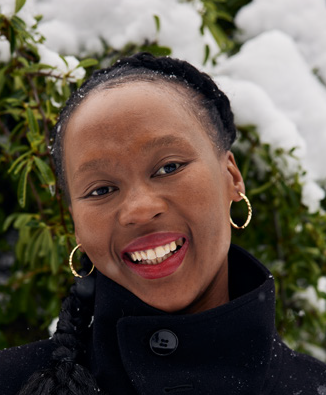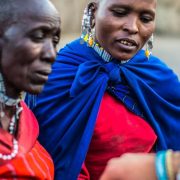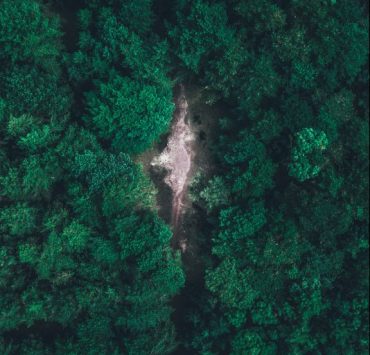Thoughts from a Single Mother in the Diaspora

Nomkhumbi Mkhize is a Canadian-born South African with a Zulu…
When I was 14 years old, my parents separated, and my mother had to readjust herself to the challenge of Afrikan single parenthood in the diaspora. Now, finding myself in a similar situation, I worry about dealing with the struggles that could have been avoided were I to be raising my son on the Afrikan continent. Living this reality, I would like to pay my contributions to help uplift other Afrikan single mothers by sharing some suggestions I have for the purpose of Afrikan nation building. In order to be successful in this journey, I must examine my own beginnings and use those experiences to enrich the experiences of my son’s life.

My beginnings
October 1986, my mother, with two months left of her pregnancy with me, arrived in Canada with my father. This was a chance for my parents to escape the refugee life of constantly migrating from country to country, seeking safety and stability that racism and oppression, far too often, tends to strip people of. Although I was born in Canada, my earliest childhood memories were of me living in South Africa.
Despite tragedies of political struggles in South Africa at the time, at 2 years old my parents allowed me to be raised with our extended family in Soweto, a township outside of Johannesburg. This provided me the opportunity of a big community and privilege of meeting my now late brother, for the first time ever.
I did not recognize my mother when she came to South Africa before my 6th birthday in 1992. I was confused because at that time no one had explained to my brother and I that our mom was alive and in a distant country. I now understand telling children their exiled mom is alive could have had ugly consequences. For the next 6 months, before moving back to Canada, my brother and I would quickly transition into understanding our mom is our mom.
Being born in Canada was a title my grandmother ensured I carried like a badge of honor. So much so, she ensured that I went to an English speaking school. The ironic part was when I came back to Canada, the only sentence I knew how to say in English was ‘I am from Canada’, in a thick Zulu accent. As a young adult we laughed about her wasting her money on that “impersonating a white school” school.
It was not until later that I realized leaving South Africa meant leaving the safety and stability brought on by community, being embraced by the culture and traditions that is Zulu. Sadly, my brother would never return home. But for me, it would be years before I returned, and I realized that by the treatment we received in our final days before leaving. We had lots of love. I would spend the rest of my childhood feeling like my identity was stripped away. The result of this were feelings that created unnecessary obstacles, due to circumstances, that hindered the development of my individual responsibility and commitment to my contribution to Afrikan nation building. In order for this agenda to be truly effective, it must be nurtured from the day each Afrikan child comes out of their mother’s womb.
Fast forward to 2021, I now find myself living in a diaspora as a mother of a 2 year old Afrikan son whose father is Zimbabwean. During the moments I am faced with challenges, I tend towards planning rather than feeling defeated. I use these moments as an opportunity to analyze and plan on how to, not raise my son the best I can, but rather how to do it properly under the conditions I and so many other women in the diaspora are faced with. This is a time to go back to the drawing board and come up with basic, practical guidelines on how to ensure this next generation is ready to rise, with the tools they have.
An important question that needs to be asked is: how do I instill a strong sense of self in my son, in a way that will guide him to being instrumental in the rebuilding of the Afrikan nation? I will put forth ideas of crucial tactics that single Afrikan mothers can incorporate into raising their children in a diaspora that can contribute to being a positive impact to the global Afrikan community.
Necessity of Emotional, Physical, and Mental Wellbeing
Emotional maturity and overall well being needs to be nourished for the stability of your little ones. You must learn to get over heartbreaks, accepting what is, dealing with the shame and guilt associated with being a single mother, most importantly you must learn to not approach this new challenge in your life as an already failed attempt just because you procreated with someone who is not for you. Once you remove all this junk from your consciousness that is when you can really focus on the task at hand. Just like in mathematics, there are many avenues you can take to get to the right answer.
Self care, exercise, eating right, finding time and space to cater to your needs by learning skills you have always wanted to learn but never did is crucial, and the opportunities will present themselves. This is a space for you to be creative. Understand that your womb is in a constant need for creating. It does not stop with a baby. Create a meal, a drawing, a vision for yourself and your family. Creating and maintaining that creation is what we do as women. You have a choice. You can choose to create and maintain chaos in your life (inevitably in your children’s lives) or you can create and maintain love for life.
Setting the standards for self care will give you peace of mind. If you think about it expressing love for yourself in this manner teaches the world you are worth loving and will teach your children how to take care of themselves and that they are worth loving as well.
Educate the Child for Consciousness and Character
When watching TV do not only ensure your child is watching age-appropriate television shows, but also pay attention to the messages of those children’s shows. A good example is a sing-along cartoon show called “5 Little Monkeys Jumping on the Bed” that I happened to pay attention to when my toddler was having some TV time. It depicts all of the humans as either children, parents, or a doctor, all of which are of the Caucasian race. But all of the monkeys jumping on the bed were depicted as humanized apes with a tail where the little girl monkeys had puff ball hairstyles, and the mother monkey was wearing an African fabric dress often seen worn by Afrikan women.
I could not help but think how these types of racist images could shape how an Afrikan child living in the diaspora could view themselves, when repeatedly receiving messages that the world they live in views them as untamed apes. Or for the Caucasian children absorbing these Eurocentric images, in which ways might their interactions be like with my Afrikan son if they view themselves as superior to him? It is easy for children growing up in the diaspora to get lost in these degrading belief systems. Remember you are trying to instill confidence, resilience, and intelligence in your children. These bigoted perceptions are a liability to the success of our children.
Educate the Child for Knowledge and Progress
Read lots of books to educate yourself. Read lots of books to your children as well. Start this process early and eventually they will start reading to themselves. Dedicate their time to learning an Afrikan-based curriculum. This could be a solo project or something other members of Afrikan children in your community could be a part of. In doing so, this will instill a strong sense of pride, identity, and a sense of belonging. We see these outcomes in thriving communities.
In the article “How Literacy Became a Powerful Weapon in the Fight To End Slavery”, written by Collette Coleman, the author explains, after the 1831 Nat Turner revolt, slave owners made enforced literacy laws which made it illegal for African Americans to learn how to read or write. Blacks would secretly educate themselves and their children. These self-guided classroom lessons would have been lessons taught from the Afrikan perspective. But when racial integration in the classroom came into play, in the 1960’s, designing our own curriculum was suddenly a thing of the past, and in the hands of a distrusted people that have never served the African American population. This gave power to a people, who have repeatedly proved to be untrustworthy, and have full access in shaping the minds of the black youths.
No thriving groups of people would accept full access to their oppressors to educate their children. Something tells me, this was not the intention of freedom fighters, like Dr. Martin Luther King Jr, when fighting for equal rights in education. Using some quality time spent with your child to analyze the quality of education for Afrikan peoples, will help prepare them to think critically about the world they live in.
Create Mother-Child Time
One common thing working class immigrant parents seem to have in common when they have the opportunity to live in the diaspora is that they often work many hours out of fear of not being able to make ends meet, financially. So they overcompensate by working many hours a day (and night) to ensure they can comfortably provide for their families both in the diaspora as well as the families they have left behind in their home countries. These are often the observations and the sacrifices I often saw my mother make to meet these demands.
There were times when she would come home, from work, and I would be asleep. When I would wake up for school then she would be asleep. When I came home from school, she would be at work. Not spending quality time with my mom would go on for days at a time. At the time, like every other child I knew that came from an immigrant household, I understood this was the life we had to live to enjoy the privileges that come with living in the Western world. But the cost seemed higher than acknowledged.
There is the perception that we diaspora dwellers are lucky to live in this part of the world. Yes, there are many privileges we can enjoy, but one thing we do not always have the luxury of enjoying is quality time with family. These times might have been less lonely times for me if there were a network of loving extended family members nearby to help fill in the gaps of what I felt was missing in my life, and that was mentorship and role models whom I could see myself in, and aspire to be like.
Encourage Your Child to Achieve their Highest Potential with the Influence of
Mentorship
Malcolm X once said, “A man who stands for nothing will fall for anything”. Having a lack of positive role models or mentorship for your child may cause your child to not have a clear idea of who they want to become. Having some sort of guidance, for your child, that is outside of yourself, will cut out some confusion that may come with not knowing how great their potential can be. Living in a diaspora, you probably are viewed as a minority. It may be a little harder to find suitable individuals who can take on the role of mentorship for your child, seeing there may not be a lot of choices in your environment. Finding a suitable candidate will take work on your part.
Same sex mentorship of the child are deeply valued in Afrikan societies. Gender roles are defined and allocated to the specific gender. Ensure to expose your child to positive black role models, who they can identify with, and who can be a positive influence in shaping who they grow into as adults. It is necessary that we understand that it takes a man to raise a boy to be a man, and it takes a woman to raise a girl to be a woman, as well as the need for the same race mentorship relationship.
After all, when Queen Nandi found herself pregnant out of wedlock, and was exiled from her clan, she managed to pick herself up with young ShakakaSenzagakhona. They happened to be welcomed by another man from another clan who trained and taught young Shaka the art of war. Young Shaka grew up to be the founder and king of the Zulu nation, one could easily say the attribution of his mentor’s influence could have contributed to the molding of a great leader and the future king, Shaka Zulu.
The Necessity of the Afrikan Family
Be mindful of who you expose your children to. When it comes to your dating life, take into account the damage that can take place when having multiple partners come in and out of their lives, what messages they might have about relationships, love, and partnerships. As the main caregiver for your children, teaching by leading by example will pay off.
Giving your children the skills they need to be proactive in problem solving in any situation that comes their way will pave the way to making them great individuals. You may not be in a position to be the example of what a functional two parent household may look like. But you are in a position to be the example of what a functional woman may look like. Note, it takes a holistically mature individual to be in a functional relationship to begin with. These are the tools needed to maintain the functionality of the Afrikan family, to build a positive Afrikan community, and eventually a thriving Afrikan nation.
What's Your Reaction?
Nomkhumbi Mkhize is a Canadian-born South African with a Zulu background. While studying to be an herbalist for over ten years, she became a certified medicinal herb farmer in 2020. She has achieved her certificate as a Doula with the Nesting Doula Collective specialising in BIPOC women and babies. She is now studying to be an acupuncturist with the desire and intention of creating a holistic healing clinic in the future. In conjunction with her current skills and experiences, she plans to bring health and wellness to her community. She is currently residing in Victoria, British Columbia Canada with her son.
















